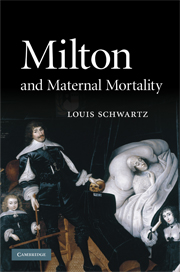Book contents
- Frontmatter
- Contents
- Acknowledgments
- Abbreviations
- Introduction
- PART I BEHIND THE VEIL: CHILDBIRTH AND THE NATURE OF OBSTETRIC ANXIETY IN EARLY MODERN ENGLAND
- PART II “SCARCE-WELL-LIGHTED FLAME”: THE REPRESENTATION OF MATERNAL MORTALITY IN MILTON'S EARLY POETRY
- PART III “CONSCIOUS TERROURS”: THE PROBLEM OF MATERNAL MORTALITY IN MILTON'S LATER POETRY
- 7 The wide wound and the veil: Sonnet 23 and the “birth” of Eve in Paradise Lost
- 8 “Conscious terrours” and “the Promis'd Seed”: seventeenth-century obstetrics and the allegory of Sin and Death in Paradise Lost
- 9 The “womb of waters” and the “abortive gulph”: on the reproductive imagery of Milton's cosmos
- Index
- References
9 - The “womb of waters” and the “abortive gulph”: on the reproductive imagery of Milton's cosmos
Published online by Cambridge University Press: 04 December 2009
- Frontmatter
- Contents
- Acknowledgments
- Abbreviations
- Introduction
- PART I BEHIND THE VEIL: CHILDBIRTH AND THE NATURE OF OBSTETRIC ANXIETY IN EARLY MODERN ENGLAND
- PART II “SCARCE-WELL-LIGHTED FLAME”: THE REPRESENTATION OF MATERNAL MORTALITY IN MILTON'S EARLY POETRY
- PART III “CONSCIOUS TERROURS”: THE PROBLEM OF MATERNAL MORTALITY IN MILTON'S LATER POETRY
- 7 The wide wound and the veil: Sonnet 23 and the “birth” of Eve in Paradise Lost
- 8 “Conscious terrours” and “the Promis'd Seed”: seventeenth-century obstetrics and the allegory of Sin and Death in Paradise Lost
- 9 The “womb of waters” and the “abortive gulph”: on the reproductive imagery of Milton's cosmos
- Index
- References
Summary
At this point, I hope I have convinced most readers that allusions to contemporary obstetric conditions and to Milton's own biographical experience of them are of central importance to Paradise Lost. There is, however, one aspect of the epic that requires further comment in this respect: Milton's cosmology. This is a difficult and contested area of study, and comprehensive conclusions about it lie outside the framework of this book, but the reproductive images that Milton used to describe his cosmos have long been recognized as important, and it has been rare for scholars to pay much attention to contemporary obstetric contexts in interpreting them. I would therefore like to conclude with some suggestions about how attention to such contexts, especially to anxieties attendant upon maternal mortality, might help us to better understand some of the stranger aspects of these images.
Milton's descriptions of the physical layout of his universe have caused a good deal of confusion over the years, and his seeming failure to be clear about particular details has been attributed to a number of causes. Some have said that he was himself confused in the face of the various debates of his day concerning astronomy, and that this led him either to self-contradiction or to an unsuccessful attempt at reconciling the traditional Ptolemaic scheme (in its later Alphonsine elaboration) with the cosmologies implied by Genesis and by various classical, medieval and contemporary authors.
- Type
- Chapter
- Information
- Milton and Maternal Mortality , pp. 245 - 260Publisher: Cambridge University PressPrint publication year: 2009

